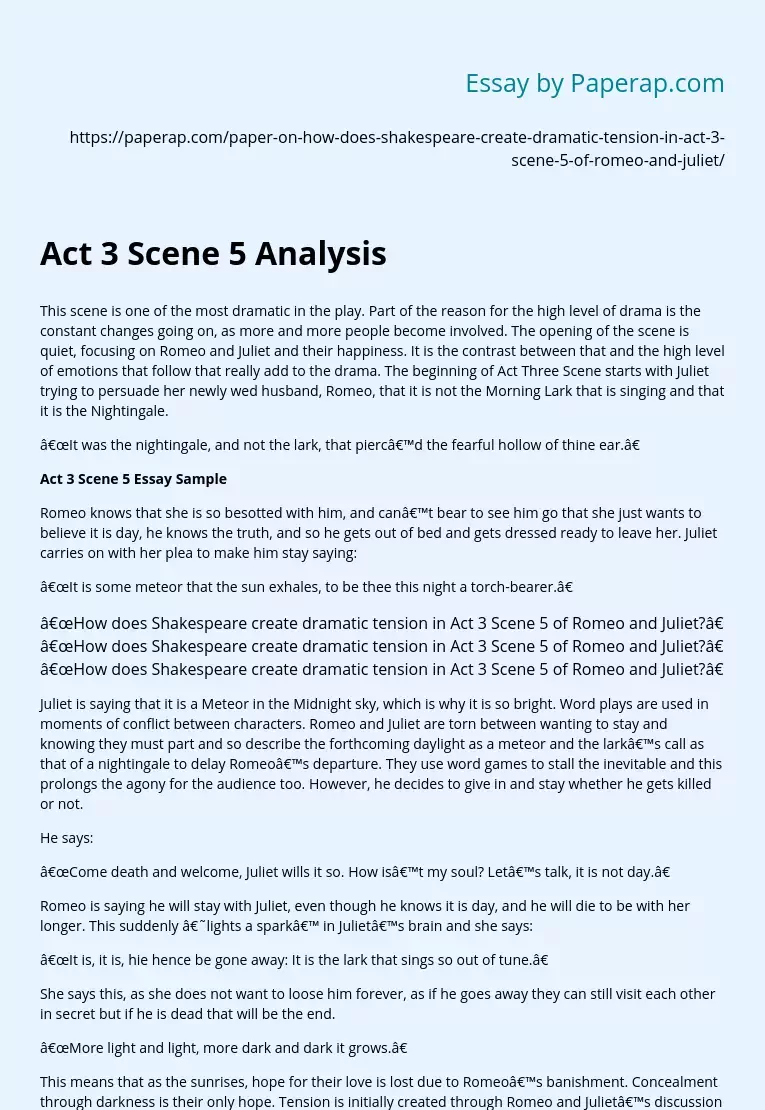Act 3 Scene 5 Analysis
This scene is one of the most dramatic in the play. Part of the reason for the high level of drama is the constant changes going on, as more and more people become involved. The opening of the scene is quiet, focusing on Romeo and Juliet and their happiness. It is the contrast between that and the high level of emotions that follow that really add to the drama. The beginning of Act Three Scene starts with Juliet trying to persuade her newly wed husband, Romeo, that it is not the Morning Lark that is singing and that it is the Nightingale.
“It was the nightingale, and not the lark, that pierc’d the fearful hollow of thine ear.”
Act 3 Scene 5 Essay Sample
Romeo knows that she is so besotted with him, and can’t bear to see him go that she just wants to believe it is day, he knows the truth, and so he gets out of bed and gets dressed ready to leave her.
Juliet carries on with her plea to make him stay saying:
“It is some meteor that the sun exhales, to be thee this night a torch-bearer.”
“How does Shakespeare create dramatic tension in Act 3 Scene 5 of Romeo and Juliet?” “How does Shakespeare create dramatic tension in Act 3 Scene 5 of Romeo and Juliet?” “How does Shakespeare create dramatic tension in Act 3 Scene 5 of Romeo and Juliet?”
Juliet is saying that it is a Meteor in the Midnight sky, which is why it is so bright.
Word plays are used in moments of conflict between characters. Romeo and Juliet are torn between wanting to stay and knowing they must part and so describe the forthcoming daylight as a meteor and the lark’s call as that of a nightingale to delay Romeo’s departure. They use word games to stall the inevitable and this prolongs the agony for the audience too. However, he decides to give in and stay whether he gets killed or not.
He says:
“Come death and welcome, Juliet wills it so. How is’t my soul? Let’s talk, it is not day.”
Romeo is saying he will stay with Juliet, even though he knows it is day, and he will die to be with her longer. This suddenly ‘lights a spark’ in Juliet’s brain and she says:
“It is, it is, hie hence be gone away: It is the lark that sings so out of tune.”
She says this, as she does not want to loose him forever, as if he goes away they can still visit each other in secret but if he is dead that will be the end.
“More light and light, more dark and dark it grows.”
This means that as the sunrises, hope for their love is lost due to Romeo’s banishment. Concealment through darkness is their only hope. Tension is initially created through Romeo and Juliet’s discussion about leaving one another. Leaving in daylight will be disastrous for Romeo:
“I must be gone and live, or stay and die.”
Tension is added by the nurse’s comment that Lady Capulet is approaching: “Your lady mother is coming to your chamber”; the audience will be concerned that there is a danger of them being discovered by Lady Capulet arriving in her daughter’s room. Juliet’s words are pessimistic: she asks whether she will ever see Romeo again.
When her mother, Lady Capulet, enters the room she finds Juliet weeping on her bed. Lady Capulet misunderstands Juliet’s weeping for sadness at the death of Tybalt. However, Lady Capulet does not know that the real reason for her weeping is that Juliet is upset over Romeo’s departure and the uncertainty over whether she’ll ever see him again. Tension is built up through Lady Capulet’s discussion about Romeo, and Juliet’s double meanings in everything she says. She tells the truth but manipulates the language she uses so that she deceives her mother.
Near the beginning of Act 3, Scene 5 Lady Capulet uses persuasive language to encourage Juliet to agree to marry Paris. For instance:
“Joyful tidings”, and “sudden day of joy”.
However, Juliet rejects any say of the matter. She reacts very determined and aggressive by saying:
“He shall not make thee there a joyful bride”.
The audience are now aware of her feelings towards the marriage. The news that she must marry Paris in just a few days time increases the tension in the scene: Juliet is outraged, and her mother is furious with her disobedience. Juliet realises she is caught in a trap, because she cant be a bigamist by marrying Count Paris on Tuesday at St Peter’s Church. She also knows that she can’t be unfaithful to Romeo, and it is against her religion to marry two people. At this point, the audience would sympathise with Juliet due tot eh position she’s been put in.
They have seen her fall in love an yet she has no choice but to obey her parents and marry Paris.
Act 3 Scene 5 Analysis. (2019, Nov 06). Retrieved from https://paperap.com/paper-on-how-does-shakespeare-create-dramatic-tension-in-act-3-scene-5-of-romeo-and-juliet/

